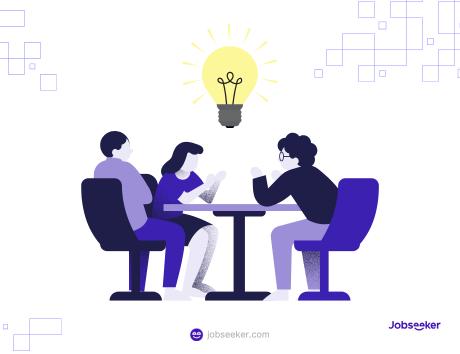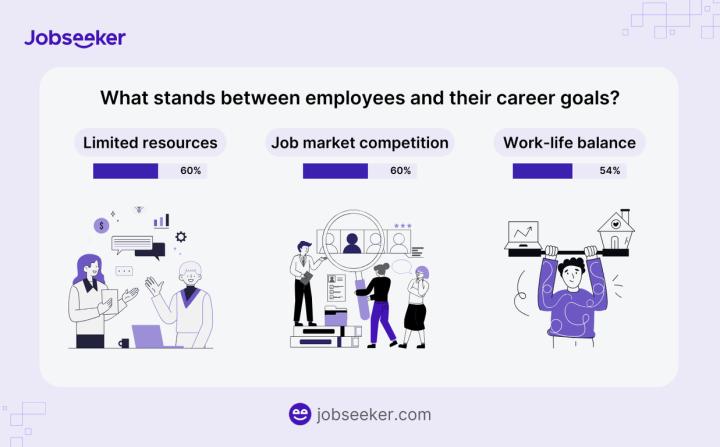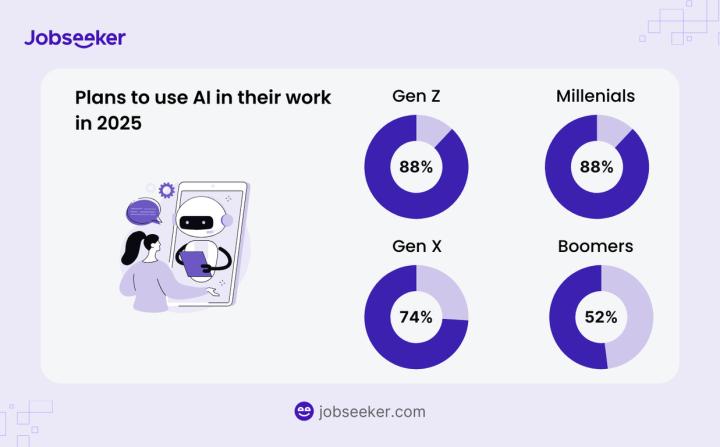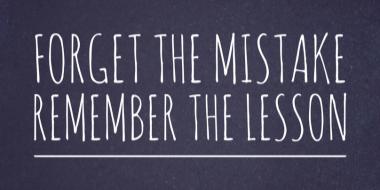5 Ways to Help Your Employees Achieve Their Career Goals for a More Productive Workplace
Workers who feel more supported and valued are more likely to go the extra mile for you when it really matters. As such, helping employees achieve their personal career goals can be one of the most effective ways to increase employee satisfaction and productivity. A new study shows that 85% of US workers had personal career resolutions for 2024, but only 9% managed to complete them. Among those resolutions, around half of employees wanted to add skills to their repertoire that could impact both their careers and the success of their company.

Achieving personal goals is one of the most effective ways to increase happiness and job satisfaction. If employees feel they’re working towards an objective that progresses their career, they’re far more likely to be motivated, and to increase their productivity accordingly. Studies show a positive correlation between happy employees and workplace productivity levels, while companies with disengaged, unhappy workers risk paying a heavy price.

However, various factors stand in the way of employees completing their career objectives. These can include the pressure that comes from job market competition, a lack of access to resources and challenges associated with work-life balance. As employers, addressing and removing these barriers to personal development could have a transformative effect on your workforce. In this article, we discuss how to be more supportive of your employees to help them achieve their career goals, to benefit both your workforce and the wider organization.
Five tips for helping your employees achieve their career goals
These tips can help you support your employees to reach their career objectives for 2025. The guide draws on recent research from Jobseeker on the most popular career resolutions for US employees, and the barriers preventing them from reaching their goals in the coming years:
1. Help them identify their career path
Identifying a clear career path is one of the most popular goals for employees in 2025. For younger employees, unclear goals are one of the greatest barriers to career progression, with more than a third of Gen Z and Millennials identifying this as a factor that stopped them from achieving their goals in 2024.
Developing career pathways for employees can help them feel more positive about the future, and more capable of progressing to the next level. This could mean creating clearer policies around the thresholds and expectations required to achieve promotion, and providing opportunities for employees to take the next step. If workers can see realistic and achievable prospects for career progression, evidence suggests they’re more likely to stay with their current employer.
Goal-setting can also be a valuable way for employees to gain clarity over their career progression. This can take the form of appraisals that set objectives for the year ahead or the introduction of goal-setting tools to help workers take their career progression into their own hands.
2. Encourage a culture of continuous learning
Continuous learning is a critical factor in equipping employees to advance their careers. Creating a work environment that encourages developing new skills and exploring new opportunities can be empowering for employees. It can also have a transformative effect on your company’s performance.
Developing both hard and soft skills is high on the agenda for US employees who set themselves career resolutions. In fact, 53% of survey respondents mentioned adding hard skills as an objective for 2025, alongside 44% wanting to develop their soft skills.
Investing in internal training programs has various benefits for companies. Research suggests the return on investment for a company’s spend on training can be as high as 353%. Besides upskilling the current workforce to become more productive, a culture of continuous learning can help keep costs down because it's less expensive to invest in the ongoing development of current employees than to train new workers.
Limited resources were cited by employees as one of the key barriers preventing them from achieving their career goals for 2024. As many as six in 10 felt they didn’t have the resources required to fulfill their ambitions. Some ways you could equip and empower your employees to pursue their development include personalized development plans, giving them access to courses and workshops, and internal skills swaps.

3. Create flexible, dynamic, and positive work environments
A better work-life balance is one of the key objectives of almost half the US workforce, with 48% of survey respondents stating they want to focus on this area in 2025. Flexible, dynamic and positive work environments are known to attract the best talent. Additionally, helping your employees find the right balance between their work and life outside the workplace can improve mental and physical health, and make your employees more productive.
Interestingly, while a better work-life balance is a key objective for around half of US workers, a similar proportion cited their current work-life balance as a key obstacle stopping them from achieving their objectives. This means creating a workplace culture that supports more flexible, dynamic working can help employees to feel more empowered to reach their goals. Consider introducing mental and physical wellness programs, recognize milestones and achievements, and encourage positive, practical feedback to help your employees feel more supported in achieving a healthier work-life balance.
4. Embrace AI to facilitate better workflow
With a lack of resources and time, and challenges to work-life balance making it more difficult for employees to achieve their career goals, it’s worth considering which tools could free employees to complete more of their objectives. Our survey discovered that nine out of 10 US employees would like to use AI to help them achieve their goals in 2025.

The power of AI tools is starting to revolutionize the way we work, and with a thoughtful, strategic approach it may be possible to find ways for employees to integrate AI into their workflows and personal development for 2025. This could reduce the burden of certain everyday tasks, giving them more time to focus on important personal development. AI could also directly assist employee skills development via various training tools.
5. Consider generational needs
While some goals are universal across the workforce, and some challenges prevent almost all workers from fully realizing their career ambitions, there are also generational differences to consider. Jobseeker’s research finds that younger workers are far more likely to seek clarity about their career direction, promotion or new job opportunities than older respondents.
Conversely, those aged 60+ were far more likely to prioritize work-life balance and mental health than other age groups. Job market competition, limited resources, and unclear career goals were the most frequently cited obstacles for younger workers, while older generations were more likely to mention a lack of time as the primary challenge to completing their career goals.
It’s clear that life and career stages are both influential in directing the career goals of American employees. As such, a one-size-fits-all approach to supporting your employees’ personal development risks not suiting anyone. Thankfully, there are a whole host of simple cultural and practical changes you can make to empower your employees to achieve their goals for 2025, whatever their age or seniority.
Get ready for your 2025 career goals
Empowering your team to achieve their career goals can definitely have a transformative impact on your employees and the wider organization. But it’s also important to focus on your own development as a business leader. Take a look at these resources to level up your leadership in 2025:
- For managers, and those who want to become one: The Making of a Manager: What to Do When Everyone Looks to You
- For building habits that will get you to your 2025 career goals: The Power of Habit: Why We Do What We Do in Life and Business
- For hand-curated insights and inspiration from Harvard Business Review, to unlock the best in those around you: HBR on Leadership – see on Spotify
- For the definitive playbook for working, learning, and living in the new age of AI: Co-Intelligence: Living and Working with AI
- For non-technical business leaders who need to find AI opportunities, align AI capabilities with strategy, and deliver ROI: AI in Business Podcast
Impress potential employers with your resume
Follow step-by-step professional guidance to create a polished resume in minutes.



